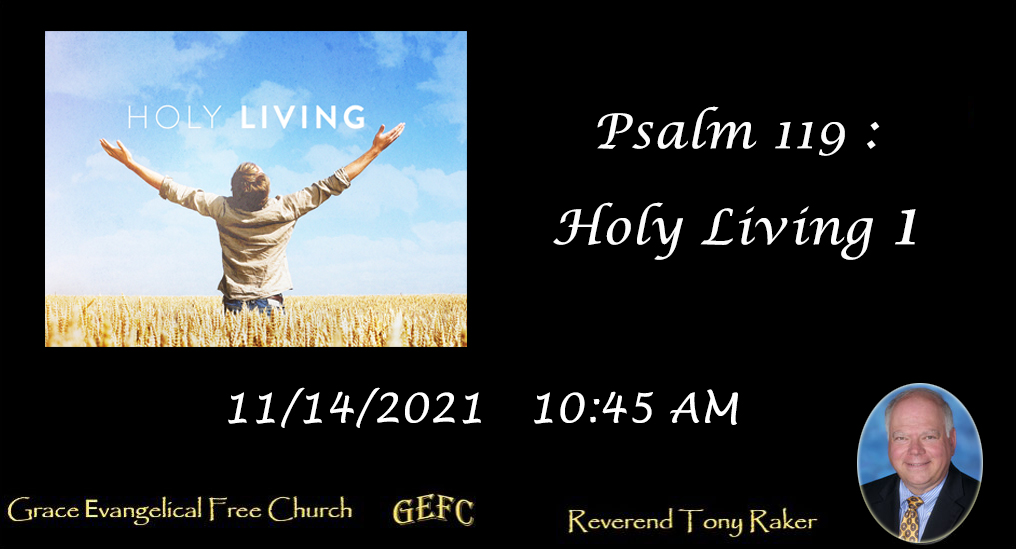All Sermons


Psalm 119 is an instruction how, in the midst of cultural upheaval, to stand firm as does God and His Word in the Heavens.
Psalm 119:1: “Blessed are those whose way is blameless, who walk in the law of the Lord!”
- Grammatical Usage: “Blessed” or in the Hebrew, “’esher” meaning, “favored in the sense of bliss”; “blameless” or “tamiym” meaning, “complete; whole; sound; undefiled; without blemish”; “walk” or “halak” meaning, “manner of life; all that one does.”
- Literal Interpretation: How favored, blissful are those whose life, judged by actions which are true and correct, is without blemish, who, in their manner of life do all according to the Lord’s instruction!
- Contextual/Comparison: God keeps His Word: God continually uses His Word. There are two major themes to Psalm 119:
- The persecution and affliction of the person of God.
- Written by David, Ezra, or Daniel
- Each of these proposed authors suffered serious difficulties in his life, and the author of Psalm 119 reflects that in descriptions of plots, slanders, and taunts against him ( 23, 42, 51, 150), persecutions (vv. 61, 86, 95, 110, 121, 134, 157, 161), and afflictions (vv. 67, 71, 143, 153)
- The profound truth that the Word of God is all-sufficient.
- Psalm 119 is an expansion of Psalm 19:7–9: “The law of the LORD is perfect, reviving the soul. The statutes of the LORD are trustworthy, making wise the simple. The precepts of the LORD are right, giving joy to the heart. The commands of the LORD are radiant, giving light to the eyes. The fear of the LORD is pure, enduring forever. The ordinances of the LORD are sure and altogether righteous.” In almost every verse, the Word of God is mentioned.
- Psalm 119 affirms not only the character of the Scriptures, but it affirms that God’s Word reflects the very character of God Himself. Notice these attributes of God ascribed to Scripture in Psalm 119:
- Righteousness (vv. 7, 62, 75, 106, 123, 138, 144, 160, 164, 172)
- Trustworthiness (v 42)
- Truthfulness (vv. 43, 142, 151, 160)
- Faithfulness (v 86)
- Unchangeableness (v 89)
- Eternality (vv. 90,152)
- Light (v 105)
- Purity (v 140)
- Psalm 119, is an alphabetic acrostic, meaning that the first letters of each line in Hebrew follow through the alphabet, 8 lines per letter, thus 8 lines x 22 letters in Hebrew = 176 lines. An overriding message of this psalm is that we are to live a lifestyle that demonstrates obedience to the Lord, who is a God of order (hence the acrostic structure), not of chaos unlike the prevailing culture of Ezra or our own.
- The psalm opens with two beatitudes. “Blessed” are those whose ways are blameless, who live according to God’s law, who keep His statutes and seek Him with all their heart.
- The author of the psalm is a man who has known great trouble in his life, but also one who has come through it with a deep and passionate understanding of God’s unfailing love and compassion (Psalm 119:75–77).
- Throughout his affliction, the author clings to the truths he learns from the Scriptures, which are eternal and “stand firm in the heavens” (Psalm 119:89–91).
- His love for the Word of God and his dedication to remember it and live by it is a theme that is repeated over and over (vv. 11, 15–16, 24, 34, 44, 47, 55, 60, etc.).
- The Word of God is sufficient to make us wise, train us in righteousness, and equip us for every good work (2 Timothy 3:15–17).
- Conclusion: Are you blessed in this way?
